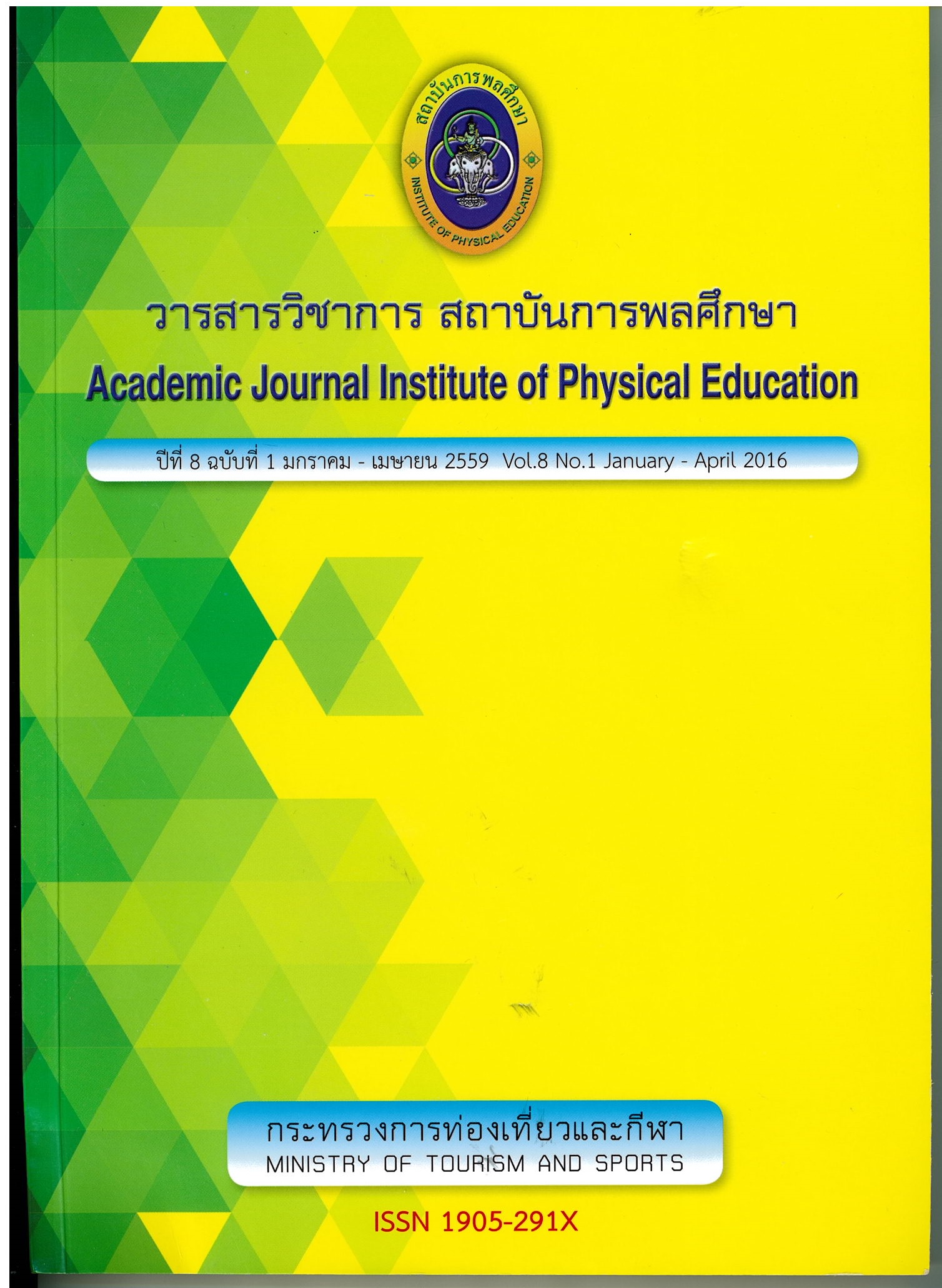Factors in Relation to Thailand Professional Football Referee Development
Main Article Content
Abstract
The purpose of this research was to analyze the factors related to Thailand professional football referee development.
The sample was a group of 978 Thai professional referees and assistants selected by Quota Sampling Technique from six regions. The research instrument was a set of questionnaires constructed by the researcher. They were administered and distributed to the subjects in all six regions. The data were then analyzed using Confirmatory Factor Analysis (CFA).
vas found that the professional football referee development model was moderate fit (CFI = .834), composed of 10 factors namely Competence; Professional Responsibility and Integrity; Competition Controlling; Employment Conditions; Welfare, Right Protection, Safety and Security; Responsible Refereeing; Laws, Filing Complaints, Investigation, and Punishment; and Disciplines, Guidelines and Codes of Conducts, Refereeing Competency and Managerial Refereeing Competency.
It was concluded that the factor in relation to Thailand referee development has 10 factors with moderately suitable for implementation. Employment Status, Competence, and Professional Responsibility and Integrity were significantly impacted to Thailand referee developing
It is suggested that, for Thailand referee developing, association or referee professional association has to be establish under the law or an act, control by the independent organization, and operate by full-time staff.
Article Details

This work is licensed under a Creative Commons Attribution-NonCommercial-NoDerivatives 4.0 International License.
The published article is a copyright of the Academic Journal of Thailand National Sports University. The passage appeared in each article in this academic journal is a perspective of each author which is not related to the journal. Each author is required to be responsible for all components of his/her own article. If there are any mistakes, each author must be responsible for those mistakes on his/her own.
References
การกีฬาแห่งประเทศไทย. (2543), รายงานการประเมินผลการแข่งขันฟุตบอลไปสู่อาชีพ : โครงการนําร่องระยะเวลา 5 ปี พ.ศ. 2542-2547. กรุงเทพฯ : จุฬาลงกรณ์มหาวิทยาลัย.
จุฑา ติงศภัทิย์. (2540), การศึกษาตัวบ่งชี้การพัฒนาการกีฬาของไทย : การพัฒนาการกีฬาเพื่อการอาชีพ. กรุงเทพฯ : จุฬาลงกรณ์มหาวิทยาลัย.
ดิฏฐชัย จันทร์คุณา. (2556). การนํารูปแบบการสร้างคุณค่าความสามารถในการแข่งขันมาใช้เพื่อพัฒนาประสิทธิผลองค์กรกีฬาในประเทศไทย. วิทยานิพนธ์บริหารธุรกิจดุษฎีบัณฑิต สาขาวิชาการจัดการการกีฬา, บัณฑิตวิทยาลัย มหาวิทยาลัยราชภัฏจันทรเกษม.
ภัทราวุธ ขาวสนิท. (2554). การพัฒนามาตรฐานวิชาชีพผู้ตัดสินกีฬาฟุตบอลของกรมพลศึกษา. วิทยานิพนธ์วิทยาศาสตรมหาบัณฑิต สาขาวิทยาศาสตร์การกีฬา, คณะวิทยาศาสตร์การกีฬา จุฬาลงกรณ์มหาวิทยาลัย.
รัชนี ขวัญบุญจัน, นิลมณี ศรีบุญ และดิฏฐชัย จันทร์คุณา. (2557). โครงการศึกษาแนวทางการพัฒนามาตรฐานวิชาชีพบุคลากรด้านการกีฬาและแนวทางการจัดตั้งองค์กรอิสระวิชาชีพบุคลากร ด้านการกีฬา, กรุงเทพฯ : กรมพลศึกษา.
ศุภพร มาพึ่งพงศ์. (2546). การพัฒนากีฬาอาชีพในประเทศไทย. กรุงเทพฯ :การกีฬาแห่งประเทศไทย.
อเนก ทิพรักษ์. (2546). แนวทางการพัฒนากีฬาฟุตบอลทีมชาติไทยสู่ความเป็นเลิศในทศวรรษหน้า (พ.ศ. 2545-2555).ปริญญานิพนธ์การศึกษามหาบัณฑิต สาขาวิชาพลศึกษา มหาวิทยาลัยศรีนครินทรวิโรฒ.
FIFA. (2014). Law of the Game 2014/2015. Zurich, Switzerland: FIFA.
Kline, R. B. (2005). Principles and Practice of Structural Equation Modeling. (2nd ed.). NY: The Guilford Press.
Morakinyo, E. (2008). Legal Liability of Referees for Negligence During Sports Competition. International Sports Law Review Pandektis, 7 : 467-476.


